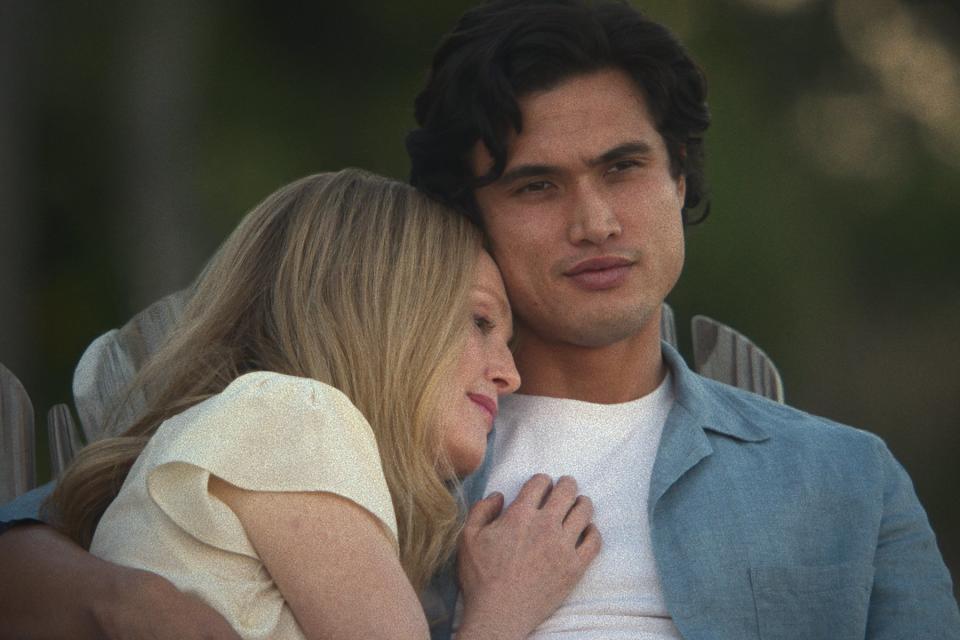How Mary Kay Letourneau Went From Media Obsession to New Film
- Oops!Something went wrong.Please try again later.

In Todd Haynes’ new film May December, a Savannah, Georgia family pretends they have it all together, until a visit from an actress starring in a movie about their lives brings the feelings they’ve tried to bury into brutal clarity. But behind the dark Netflix satire — which is getting rave reviews for its script, directing, and performances from Natalie Portman, Julianne Moore, and Charles Melton — is a real-life story that shocked the nation, one the film uses to drive home its condemnation of true crime as entertainment.
May December is loosely based on the life of American teacher Mary Kay Letourneau, who began a sexual relationship with her sixth-grade student Vili Fualaau and, following multiple prison stints, married him. Letourneau taught in Seattle, Washington, and in 1996 was found in a car with Fualaau. They told police nothing inappropriate had happened, and were initially released, but only by lying about Fualaau’s age. (She was 34. He was 12.) Their relationship continued and Letourneau was eventually arrested for second-degree rape. She pleaded guilty to the charges in 1997 and was allowed to serve a three-month reduced sentence and then probation under the terms that she would never see Fualaau again. But when she was released, she immediately violated the court order by seeing Fualaau, and went back to prison for seven years. In 2005, a year after her release, Letourneau married Fualaau, after the two convinced a judge to dismiss their restraining order.
More from Rolling Stone
The case received international public scrutiny, even after Fualaau turned 18. Letourneau maintained that she and Fualaau were in love and that she was seduced by the child. “You know what, I’m not going to continue with you trying to have me answer that question,” Letourneau said in an interview with Australia’s Channel 7, one of many where she refused to acknowledge anything wrong or illegal about her and Fualaau’s meeting. “I did my best every single day and I live that way and I did. And in that situation, it doesn’t even matter.” Fualaau and Letourneau separated in 2019. A year later, in July 2020, Letourneau died from cancer. She was 58.
While May December takes many queues — and even some direct lines — from interviews with Letourneau, the movie isn’t a biopic. Instead, it picks and chooses some of the most infamous aspects of Letournaeau’s case to emphasize the psychological impact of her crimes. Here are some key differences and similarities.

The Start of Their Relationship
May December fictionalizes how Letourneau and Fualaau met. In the film, Gracie knew Joe because he was in the same grade as her son. But it wasn’t until the two worked at the same pet store that they began their relationship — eventually being caught by the owner in the storage room. However, in real life, in addition to the couple’s age gap, much of the attention around Letourneau’s inappropriate relationship with Fualaau stems from her role as his teacher. Following her conviction, she was forced to register as sex offender and was unable to continue the profession.
Letourneau’s First Family
At the time that Letourneau met Fualaau, she was married to her first husband, Steve Letourneau. The two had four children together. It was Steve who was the first to discover proof of Letourneau’s relationship with Fualaau, in the form of love letters written by Letourneau to the 12-year-old. According to the Los Angeles Times, an unnamed member of Steve’s family tipped the police off to the sexual nature of Letourneau and Fualaa’s relationship — leading to her arrest. In 1999, Steve filed for divorce. While Letourneau was prevented from contacting her children, she told several news outlets she was trying her best to remain in touch. In May December, there’s a tense scene where Gracie’s old family and new family run into each other at dinner on the eve of high school graduation. But in actuality, there’s no record that Steve ever kept in touch with Letourneau. According to People magazine, when reached out for comment about Letourneau and Fualaau’s separation, Steve said, “I’ve moved on and I have nothing to say.”
Their Hometown
May December is set in the town of Savannah, Georgia. The crew also filmed on location, spending a short 21 days before wrapping. In the film, following Gracie’s prison stay, she and Joe stay in the same neighborhood where they were discovered, awkwardly running into her ex-husband, other children, and people who tolerate them. While Letourneau and Fualaau met in Seattle, Washington, much of their circumstances were similar to the film. Following Letourneau’s return from prison, she and Fualaau moved into a home in Seattle’s Normandy Park, the same neighborhood where she used to live with her ex-husband. According to both ABC News and The Seattle Times, most of Letourneau’s neighbors seemed nonchalant about the registered sex offender’s return to the community and believed she just wanted to live a quiet life with Fualaau.
Their Children
In May December, the Atherton-Yoo family had three children, an older daughter and a boy and girl set of twins, born after Gracie left prison. Letourneau only had two children with Fualaau, but dominated headlines by giving birth to their second daughter while serving her prison sentence.
“Am I sorry he’s the father of my children, and that we’re married and this is the man of my life?” she said in an A&E documentary in 2018. “No, I am not.”
Letourneau’s Remorse
Even throughout her prison stay and subsequent marriage with Fualaau, Letourneau maintained that their relationship was one of true love. In multiple interviews, Letourneau painted Fualaau as the aggressor in their relationship, saying the 12-year-old was the one who initiated contact and drove the relationship forward.
Perhaps one of the best examples of Letourneau’s mindset can be seen in the 2018 interview between the couple and Australian journalist Matt Doran. When pressed on being the adult, Letourneau shot back, “You can say that. I was by age,” before directing all her energy at questioning Fualaau. “Who was the boss? Who was the boss? Who was the boss back then?
May December uses those direct lines, but turns the tense interview into a heartbreaking moment with Gracie and Joe, as Gracie refuses to take responsibility.
“Who was the boss?” Gracie asks multiple times. “Who was in charge?”
Conflicted Feelings
In comparison, just as May December chart’s Joe’s journey from quiet acceptance to horrified knowledge that he was abused, Fualaau’s perspective on his and Letournaeu’s relationship has changed with time. When the Seattle teacher was first arrested, both Fualaau and his mother testified that he was wise for his age and denied that he was a victim. “I want people to stop seeing me as a victim,” Fualaau said in a prepared statement in 1997. “My life is going to be fine. Mary didn’t harm me in any way. Who are they to say I’m too young to know anything when they don’t even know me?”
But subsequent interviews with Fualaau revealed that in later life, he had more conflicted feelings about his relationship with Letourneau. In a 20/20 interview, he revealed that he struggled with depression and alcoholism while Leatourneau was in jail, and lacked a support system.
“It was a huge change in my life, for sure. I don’t feel like I had the right support or the right help behind me,” Fualaau said. “From my family, from anyone in general. I mean, my friends couldn’t help me because they had no idea what, what it was like to be a parent, I mean, because we were all 14, 15.”
The Ending
One of the most enduring and infamous aspects of Letourneau’s case remains the public fascination with the late Seattle teacher and the double standard she was given compared to male teachers in the same situation. She and Fualaau’s child graced the 1998 cover of People. They both maintained they were simply lovers destined to be together, unable to let society keep them apart. “We are supposed to somehow believe they were just two fools in love,” writer Sasha Brown-Wortham said in 2015. “Despite the fact that he was a child and she was an adult.” Hayne’s film is acutely aware of this, using a biting 10-minute ending sequence to not only emphasize the trauma Joe is carrying but poke holes in the inflated sense of worth Elizabeth has about telling a good story. The end result is a scathing criticism of true crime as fodder for entertainment — and a glimpse at what happens when an entire man’s world crumbles. But real life is hardly as easy. While Fualaau and Letourneau were separated, the couple never officially divorced before Letourneau died in 2020. She was surrounded by Fualaau and their children, reportedly firm in the belief that she had done nothing wrong.
Best of Rolling Stone

